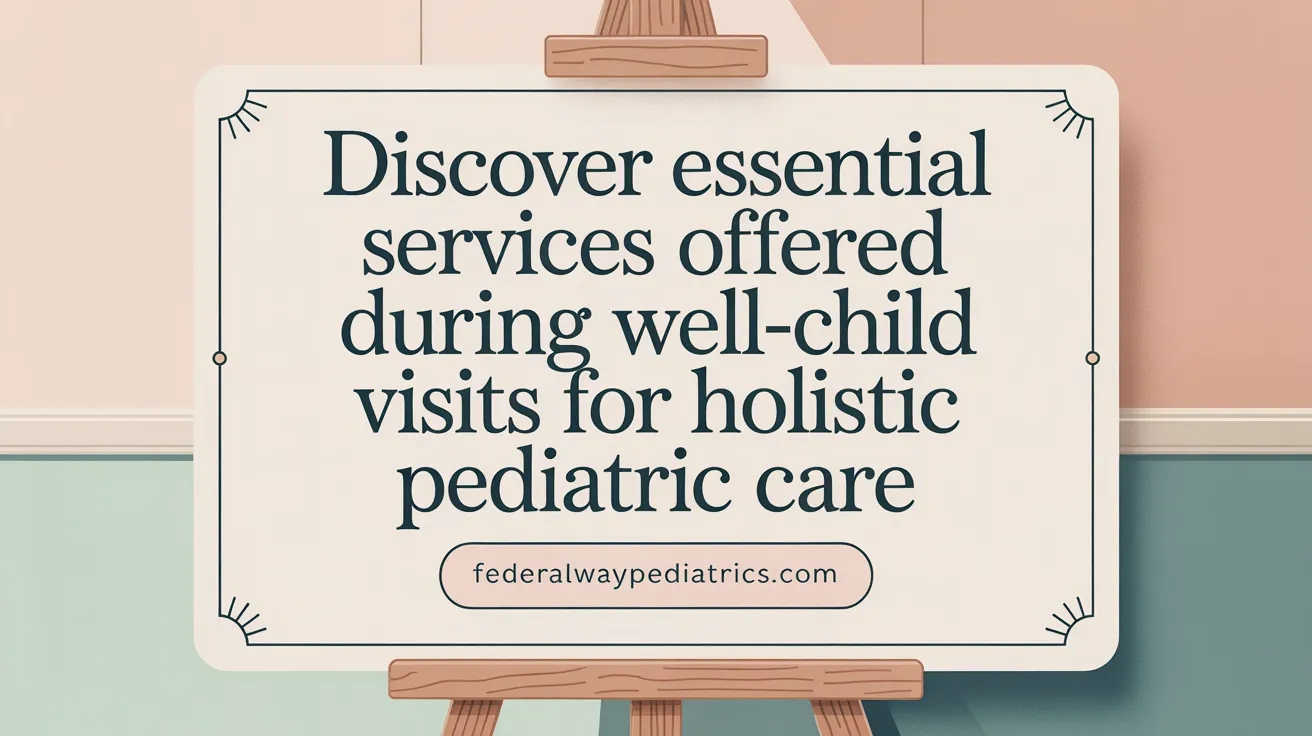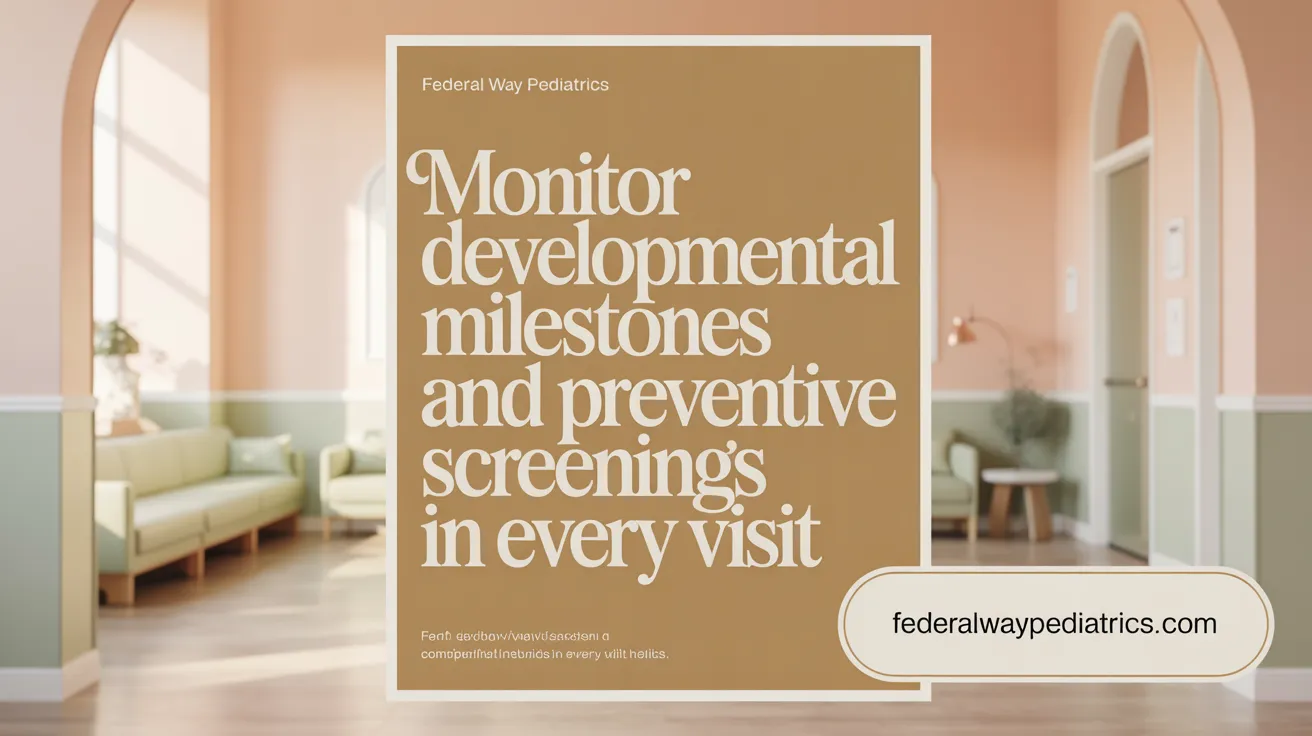Understanding the Importance of Routine Well-Child Visits
Definition and Purpose of Well-Child Visits
Well-child visits are regular healthcare appointments dedicated to monitoring a child's overall health and development. These visits involve a thorough physical examination, assessment of growth milestones, administration of immunizations, and screening for potential health issues. They serve as an essential preventive care measure, aimed at detecting early signs of illness or developmental delays, supporting timely interventions.
Holistic Approach to Child Health
These appointments take a comprehensive approach, evaluating not only physical health but also emotional, mental, and social well-being. Pediatricians discuss topics such as nutrition, sleep habits, behavioral concerns, safety, and mental health during visits. For adolescents, one-on-one time facilitates conversations about sensitive topics including body changes and mental health, fostering trust and confidence.
Overview of Care from Infancy Through Adolescence
Well-child visits start from the newborn stage with frequent checkups in the first two years of life, gradually transitioning to annual visits through adolescence. The American Academy of Pediatrics recommends a specific schedule, beginning within days of birth and continuing regularly up to age 21. These visits support healthy growth patterns, immunization schedules, and readiness for school and social activities, ensuring continuous care tailored to every stage of a child's development.
Scheduling and Scope of Well-Child Visits from Infancy to Adolescence

What is the AAP recommended schedule for well-child visits?
The American Academy of Pediatrics (AAP) recommends a thorough schedule of well-child visits starting from infancy through adolescence. Initial visits occur at newborn (3-5 days), 1 month, 2, 4, 6, and 9 months, followed by visits at 12, 15, 18 months, and 2, 2½, 3, and 4 years. From age 5 onward, annual visits continue up to 21 years. These visits align with developmental milestones and immunization needs. For detailed information, see the AAP Well-Child Care Schedule and the AAP Well-Child Care Schedule.
How often are visits at different developmental stages?
Frequency is highest in the first two years due to rapid developmental changes and vaccination schedules requiring close monitoring. After age 3, well-child visits typically become annual, supporting ongoing growth tracking and preventive care throughout childhood and adolescence. Learn more about the Well-Child Visit Schedule from Newborn to Adolescence and Child and adolescent well-visits.
What services are provided during well-child visits?
Visits include comprehensive physical exams evaluating growth, vision, hearing, and mental health. Immunizations are routinely administered to protect against vaccine-preventable diseases common in childhood. Health screenings, such as developmental assessments and body mass index (BMI) checks, help detect early signs of issues. Furthermore, pediatricians provide guidance on nutrition, sleep, safety, and behavioral health, addressing parents' concerns. For more on services, see Childhood vaccinations and health exams and Physical exams during well-visits.
Why is adhering to the well-child visit schedule important?
Following the recommended schedule enables early detection of developmental delays, behavioral concerns, and physical health problems, facilitating timely interventions. Regular visits ensure that immunizations are up to date for school, childcare, and sports participation, and they support holistic child health. Consistent attendance fosters continuous care coordination between families and providers. More information is available about the Importance of Well-Child Visits and Preventive Care and Vaccines.
Comprehensive Health Assessments During Well-Child Visits

Physical exams and developmental milestone tracking
Well-child visits include thorough physical examinations that assess a child's overall health and development. Pediatricians monitor key growth indicators such as height, weight, and head circumference, which are tracked on growth charts to ensure steady progress. These visits also focus on evaluating Developmental milestone tracking to detect any delays early, allowing for timely intervention and support. Learn more about Physical exams during well-visits and Evaluating Child Growth and Milestones.
Screening for vision, hearing, growth, BMI, and mental health
Each visit involves screening for vision and hearing problems, which are critical for learning and social development. Providers also measure body mass index (BMI) to identify and prevent obesity and assess mental health by observing behaviors and discussing any concerns related to mood or anxiety. Early identification of potential issues ensures children receive appropriate care and counseling. Additional details available on Vision and Hearing Checks and Mental health evaluation during pediatric visits.
Role of immunizations and preventive care
Immunizations are a vital part of well-child visits, providing protection against contagious diseases and ensuring children meet vaccination requirements for school and community activities. Preventive care also includes routine health screenings and counseling on topics like injury prevention, which collectively contribute to a child’s long-term health and well-being. For more information, visit Immunizations in well-visits and CDC vaccination schedule.
Discussion of nutrition, safety, and behavioral topics
Pediatricians use well-child visits to engage families in conversations about healthy nutrition, sleep habits, physical activity, and safety measures at home and school. Behavioral and social development issues are also addressed, with opportunities to discuss mental health, social interactions, and changes typical in adolescence. This holistic approach supports children’s physical, emotional, and social growth in a family-centered care environment. Explore more on Nutrition and safety in pediatric visits and Mental health evaluation during pediatric visits.
Addressing Mental, Emotional, and Social Health in Pediatric Care

How are mental health and behavioral concerns evaluated during well-child visits?
Pediatric well visits consistently include evaluation of mental health evaluation during pediatric visits and behavioral issues alongside physical checks. Providers assess Developmental milestone tracking, social interactions, and emotional well-being. This evaluation helps detect early signs of challenges such as anxiety, depression, or behavioral disorders, enabling timely intervention. Learn more about the Mental Health and Behavioral Evaluations during well-child visits.
Why is one-on-one time with adolescents important during well visits?
Starting around age 11, pediatricians allocate private time with teens during annual well-child visits. This confidential setting fosters open communication about sensitive topics including body changes, mental health struggles, substance use, and relationships. It encourages adolescents to share concerns they might not discuss in front of parents, strengthening trust and supporting their unique developmental needs. See details on One-on-One Teen Well-Visit Time.
What counseling is provided related to depression, substance use, and social issues?
Pediatric providers deliver targeted counseling on depression risks, substance use prevention, and social skills during visits. They offer guidance on coping strategies and safety, aiming to empower families and youth in navigating these challenges. This approach helps reduce stigma and promotes healthy decision-making. Additional resources on Safety, Depression, and Substance Use in Teens are available.
How do pediatricians support emotional development and holistic well-being?
Beyond physical health, pediatric care embraces a holistic focus, supporting children’s emotional growth through attentive listening and family-centered approaches. Discussions on diet, sleep habits, socialization, and mental health form routine parts of well visits. This comprehensive care encourages resilience, healthy habits, and overall well-being from infancy through adolescence. Explore holistic approaches in Holistic Care in Pediatric Visits.
Barriers and Initiatives to Improve Well-Child Visit Attendance
What Disparities Affect Well-Child Visit Attendance?
Attendance at well-child visits varies widely due to socioeconomic influences. Children covered by Medicaid and CHIP programs attend significantly fewer visits compared to those with private insurance. Factors such as racial and ethnic disparities, income levels, and geographic location also influence visit frequency. Learn more about Well-child visits and Medicaid and CHIP attendance rates.
What Challenges Do Families Face?
Many families struggle with practical barriers that impact their ability to maintain regular well visits. Transportation difficulties, lack of childcare for siblings, and demanding work schedules often prevent caregivers from bringing children to appointments. These challenges underscore the need for flexible healthcare solutions. Find details on Transportation issues for healthcare and Work responsibility challenges.
What Are Federal and State Initiatives to Promote Attendance?
Recent efforts include the Centers for Medicare & Medicaid Services (CMS) launching initiatives such as educational webinars and quality improvement programs. These target increasing well-child visit utilization among Medicaid and CHIP enrollees. States are also implementing strategies like patient-centered medical homes and incentivizing preventive care services. Explore more about CMS initiatives for well-child visits and Patient-centered medical homes.
Why Is Continuous Care Important?
Maintaining a continuous relationship with a primary care provider supports comprehensive and coordinated care. Patient-centered medical homes emphasize Holistic Care in Pediatric Visits, which helps reduce emergency visits and promotes preventive health. Continuous care ensures early detection and timely interventions, critical for healthy child development. See insights on Importance of Well-Child Visits.
By addressing these barriers and supporting these initiatives, families in Federal Way, Washington, and beyond can improve well-child visit attendance and overall pediatric health outcomes. Learn about Personalized Healthcare in Federal Way Washington and Federal Way pediatric care efforts.
Local Access to Quality Pediatric Care in Federal Way, Washington
Role of pediatric providers like CCM Pediatrics Federal Way
In Federal Way, Washington, CCM Pediatrics stands out as a trusted pediatric healthcare provider offering comprehensive care from infancy through adolescence. Their team focuses on delivering personalized and top-quality services that support a child's physical, emotional, and developmental needs.
Services offered including preventive care and acute illness management
CCM Pediatrics provides a full range of pediatric services including newborn and Child and adolescent well-visits, immunizations, preventive medicine, and management of acute illnesses. They also offer sports physicals to support active children’s health. The clinic accepts same-day walk-ins for established patients with acute concerns, ensuring timely intervention and care.
Convenience and importance of ongoing personalized care
Located near St. Francis Hospital, CCM Pediatrics offers convenient access to emergency and specialized services when necessary. The clinic emphasizes the importance of regular AAP Well-Child Care Schedule—a cornerstone of maintaining health—where growth, Developmental milestone tracking, vision, hearing, and Mental health evaluation during pediatric visits are carefully evaluated. Consistent personalized care fosters strong provider-family partnerships, crucial for addressing health concerns early and supporting overall well-being.
How local clinics integrate holistic pediatric cardiology and specialty care
Beyond general pediatric care, clinics like CCM Pediatrics integrate a holistic care for children approach that includes pediatric cardiology expertise when needed. This integration ensures children receive coordinated specialty care along with routine assessments, reinforcing comprehensive health management. Families in Federal Way benefit from this multidisciplinary care model, which bridges preventive, acute, and specialty pediatric services under one accessible umbrella.
Ensuring Holistic Child Health Through Consistent Well-Child Care
The Importance of Routine Well-Child Visits
Regular well-child visits are essential for a child's overall health, supporting physical growth, emotional well-being, and early detection of health issues. These visits provide opportunities for immunizations, developmental screenings, and preventive counseling on nutrition, safety, sleep, and mental health.
Collaborative Role of Families and Providers
Families and pediatric healthcare providers work in partnership to ensure comprehensive care. Pediatricians offer personalized assessments and guidance, while families contribute vital health information and participate actively in follow-up care, fostering a team approach to optimized child health.
Following the Recommended Visit Schedule
Adhering to the suggested well-child visit schedule—from infancy through adolescence—helps maintain steady monitoring of growth and development, enabling early intervention when necessary. Consistent attendance supports lifelong wellness and prepares children for academic and social success.
